
January 3
1868 Japan: Meiji Restoration:
In an event that heralds the birth of modern Japan, patriotic samurai from Japan's outlying domains join with anti-shogunate nobles in restoring the emperor to power after 700 years. The impetus for the coup was a fear by many Japanese that the nation's feudal leaders were ill equipped to resist the threat of foreign domination. Soon after seizing power, the young Emperor Meiji and his ministers moved the royal court from Kyoto to Tokyo, dismantled feudalism, and enacted widespread reforms along Western models. [For further details, Click here.]
1876 Birth: Wilhelm Pieck: co-founder German Communist Party and President of DDR (1949-60).
Fearing the rise of the Nazi party, Pieck passionately differentiated between his communist system and that of the 'fascists.' Pieck argued "Only the communists help the worker," whereas for the Nazi party, "Under their guidance the radicalization of the masses grows." Pieck believed that "The united strength of the working people is enormous," and that Germans should maintain their "struggles against the imperialistic threat of war and fascism, struggles for a socialist Soviet Germany." Pieck was known for his disagreement with Hitler's ascension to power, and for his alignment with Stalin.
1883 Birth: Clement Attlee: Labour politician, member of Churchill's WWII coalition government, and his successor as prime minister (1945-51).
1902 Death: Alois Hitler, the father of Adolf Hitler, in Leonding.
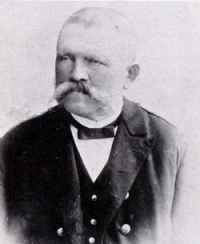
On this bitterly cold Saturday morning, Alois Hitler collapses while walking through town to confer with a local farmer about purchasing some apples. Helped to a nearby inn by some passers-by, Alois gives up the ghost while waiting for a hastily ordered glass of wine. No headstone is erected on his grave by the family, even though his wife, Klara, has received a considerable inheritance and a government pension. Josef Mayrhofer, the mayor of Leonding, is appointed as Adolf and Paula's guardian. [For further details, Click here.]
From Mein Kampf:When I was thirteen my father died suddenly. The old gentleman, who was always so robust and healthy, suffered an apoplectic stroke, and thus painlessly ended his wanderings on earth, plunging us all into the depths of despair. His most ardent desire had been to help his son forge his career, thus preserving him from his own bitter experience. In this, to all appearances, he had not succeeded. But, though unwittingly, he had sown the seed for a future which at that time neither he nor I would have comprehended.
[See: Was Adolf Hitler Jewish? and Does the Hitler DNA Test 'Prove' He Was Jewish?]
1910 Germany:The Social Democratic Congress in demands universal suffrage.
1915 World War I: The Turks plan a wide envelopment of the Russians at the Battle of Sarikamis In the Caucasus between Russia and Turkey. The Russians counterattack, smashing the Turkish army.
1917 World War I: Various:
Click here for the January 3, 1917 issue of the superior American periodical The Outlook, featuring many articles relating to the War by the finest jounalists and commentators of the day.
Gefreiter Adolf Hitler writes to Captain Frederick 'Fritz' Wiedemann at 16th RIR [List Regiment]:After a long residence in a military hospital I have for some weeks been in Munich with the reinforcement battalion of the 2nd Infantry Regiment. I am again fit for field service and, as I have heard, will shortly be posted by reinforcement transport for active service with the 2nd Infantry Regiment. My captain will understand that it is my pressing wish to be with my old regiment and old comrades. I ask that my captain request that I return to the 16th RIR. [For further details, Click here.]
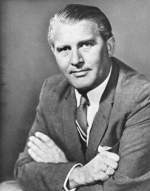
1924 Wunderwaffen: Twelve year-old Wernher von Braun is arrested for causing a disturbance on a crowded street in Berlin. The boy had been apprehended after detonating a handful of fireworks that he had attached to a toy wagon. (Braun) [See: Wunderwaffen: Hitler's Deception and the History of Rocketry.]
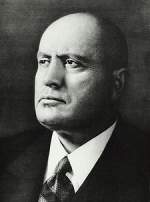
1925 Italy: Mussolini dissolves Italian parliament and the Italian Fascist State is officially proclaimed with Mussolini as Il Duce (The Leader).
1930 Weimar: Reparations: The second conference on Germany's war reparations begins at the Hague, in the Netherlands.
1933 Various:
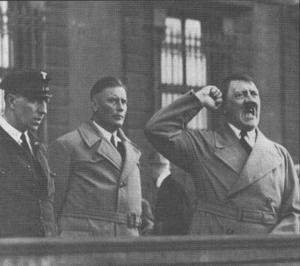
Hanussen's prediction is widely ridiculed by Hitler's enemies and the German press. (See Jan 1, 30)
Death: Wilhelm Cuno: former German Reich's chancellor (1922-23), at 56.
Cuno's government is best known for its passive resistance of the French occupation of the Ruhr. Cuno's government was also responsible for its poor handling of economic problems. In order to pay off the state's debts, the government under Cuno printed off vast amounts of money . . . .
1934 Church and Reich: At Barmen-Gemarke, in Germany, 320 pastors of the German Confessing Church meet to draw up a theological statement opposing the Nazi German Nationalist Church. Led by Karl Barth and Martin Niemoeller, the gathering led to the formula afterward known as the Barmen Declaration.
1935 Abyssinia (Ethiopia): requests the assistance of the League of Nations in its conflict with Italy.
1937: Hitler speaks before the Reichstag:
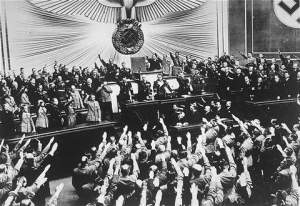
The Four-Year Plan will give permanent employment to those workmen who are now being released from the armament industry. It is significant for the gigantic economic development of our people that there is today a lack of trained workmen in many industries. There will be no strikes or lockouts in Germany, because everyone has to serve the interests of the entire nation. Education of the people will never come to an end, and this education includes the Hitler Youth, the Labor Service, the Party, and the Army. [For the full text, Click here.]
1940 World War II: German submarine U-25 secretly moors next to the German merchant ship Thalia in a Spanish port for refueling and restocking. This is the first time for a German submarine to do so at a Spanish port during the war.
1941 World War II: Canada and the US acquire air bases in Newfoundland (99 year lease). [See: War Below Zero.]
1942 World War II: Various:
Conversation: Hitler and Japanese Ambassador Oshima, in the presence of Reich Foriegn Minister Joachim von Ribbentrop:
The Fuehrer, using a map, explains to the Japanese Ambassador the present position of marine warfare in the Atlantic, emphasizing that what he considers his most important task is to get the U-boat warfare going in full swing. The U-boats are being reorganized. Firstly, he had recalled all U-boats operating in the Atlantic. As mentioned before, they would now be posted outside United States ports. Later, they would be off Freetown and the larger boats even as far down as Capetown . . . . After having given further explanations on the map, the Fuehrer pointed out that, however many ships the United States built, one of their main problems would be the lack of personnel. For that reason even merchant ships would be sunk without warning with the intention of killing as many of the crew as possible. Once it gets around that most of the seamen are lost in the sinkings, the Americans would soon have difficulties in enlisting new people. The training of seagoing personnel takes a very long time. We are fighting for our existence and our attitude cannot be ruled by any humane feelings. For this reason he must give the order that in case foreign seamen could not be taken prisoner, which is in most cases not possible on the sea, U-boats were to surface after torpedoing and shoot up the life boats. Ambassador Oshima heartily agreed with the Fuehrer's comments, and said that the Japanese, too, are forced to follow these methods.
World War II: From a Hitler Order:
Cling to every populated center; do not retreat a single step; defend yourself to the last soldier, to the last grenade. That is the requirement of the present moment. Every point occupied by us must be turned into a base, which must not be surrendered under any circumstances, even if outflanked by the enemy. If, however, the given point must be abandoned on superior orders, it is imperative that everything be razed to the ground, the stoves blown up. [For the full text of the Order, Click here.]
1943 Various:
Holocaust: A Jewish resistance group in Czestochowa, Poland, kills 25 Germans. The SS shoots 250 old people and children in reprisal. (THP) [See: Jewish War Heroes.]
Stalingrad: Rokossovsky offers Paulus surrender terms, which are rejected.
1944 World War II: Various:
The Red Army reaches the former Polish border.
Ardennes: Desperate German attacks fail to cut the Allied corridor to Bastogne.
Alsace: German attacks continue to force the US Seventh Army to retreat.
1945 World War II:Various:
Low Countries:The Dutch and Belgian governments sign a mutual agreement for repatriation of incarcerated civilians.
MacArthur and Nimitz given new commands:
On this day, in preparation for planned assaults against Iwo Jima, Okinawa, and mainland Japan, Gen. Douglas MacArthur is placed in command of all U.S. ground forces and Adm. Chester Nimitz is placed in command of all U.S. naval forces. This effectively ended the concept of unified commands, in which one man oversaw more than one service from more than one country in a distinct region.
1946 Nuremberg Tribunal:
On day twenty-six, Lieutenant Commander Whitney R. Harris presents the Prosecution's case against Ernst Kaltenbrunner:
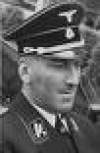
Kaltenbrunner was a life-long fanatical Nazi. He was the leader of the SS in Austria prior to the Anschluss and played a principal role in the betrayal of his native country to the Nazi conspirators. As higher SS and Police Leader in Austria after the Anschluss, he supervised and had knowledge of the activities of the Gestapo and the SD in Austria. The Mauthausen Concentration Camp was established in his jurisdiction and he visited it several times. On at least one occasion he observed the gas chamber in action. [For the full testimony, Click here.]
Otto Ohlendorf, described by Kaltenbrunner as "one of my chief collaborators," testifies for the defense: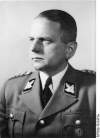
The Tribunal (Gen. Niktchenko): In your testimony you said that the Einsatz group had the object of annihilating the Jews and the commissars, is that correct?
Ohlendorf: Yes.
The Tribunal (Gen. Niktchenko): And in what category did you consider the children? For what reason were the children massacred?
Ohlendorf: The order was that the Jewish population should be totally exterminated.
The Tribunal (Gen. Niktchenko): Including the children?
Ohlendorf: Yes.
The Tribunal (Gen. Niktchenko): Were all the Jewish children murdered?
Ohlendorf: Yes.
The Tribunal (Gen. Niktchenko): But the children of those whom you considered as belonging to the category of commissars, were they also killed?
Ohlendorf: I am not aware that inquiries were ever made after the families of Soviet commissars. [For the full testimony, Click here.]
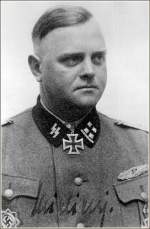
Lt. Col. Brookhart: In connection with the Jews about whom you have personal knowledge, how many were subjected to the final solution, that is, to being killed?
Wisliceny: The exact number is extremely hard for me to determine. I have only one basis for a possible estimate, that is a conversation between Eichmann and Hoess in Vienna, in which he said that only a very few of those sent from Greece to Auschwitz had been fit for work. Of the Slovakian and Hungarian Jews about 20 to 30 percent had been able to work. It is therefore very hard for me to give a reliable total.
Lt. Col. Brookhart: In your meetings with the other specialists on the Jewish problem and Eichmann did you gain any knowledge or information as to the total number of Jews killed under this program?
Wisliceny: Eichmann personally always talked about at least 4 million Jews. Sometimes he even mentioned 5 million. According to my own estimate I should say that at least 4 million must have been destined for the so-called final solution. How many of those actually survived, I am not in a position to say.
Lt. Col. Brookhart: When did you last see Eichmann?
Wisliceny: I last saw Eichmann towards the end of February 1945 in Berlin. At that time he said that if the war were lost he would commit suicide.
Lt. Col. Brookhart: Did he say anything at that time as to the number of Jews that had been killed?
Wisliceny: Yes, he expressed this in a particularly cynical manner. He said he would leap laughing into the grave because the feeling that he had 5 million people on his conscience would be for him a source of extraordinary satisfaction. [For the full testimony, Click here.]
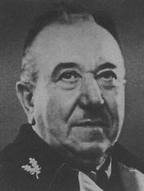
Death: Karl Maria Weisthor Wiligut, in Arolsen, Germany. His body is found by Elsa Baltrush, his SS-assigned housekeeper. She had been a member of Himmler's personal staff until she was appointed as Weisthor's housekeeper and traveling companion after his retirement from SS active duty in August 1939.
Death: William Joyce ("Lord Haw-Haw") by hanging:

The Brooklyn-born Joyce (he never lost his American citizenship) who naturalized as a German in 1940 had a rather tenuous claim on the patriotic high horse to begin with, and after the war, that meant the treason charge proceeded on legally doubtful grounds: speaking the King's English didn't mean he owed allegiance to the king. Prosecutors ultimately [hanged] him with a British passport he'd obtained fraudulently, and the legal principle has never since sat well with jurists . . . .
Joyce: In death as in life, I defy the Jews who caused this last war, and I defy the power of darkness which they represent. I warn the British people against the crushing imperialism of the Soviet Union. May Britain be great once again and the hour of the greatest danger in the West. May the standard be raised from the dust, crowned with the words--you have conquered nevertheless. I am proud to die for my ideals and I am sorry for the sons of Britain who have died without knowing why.
1959 Alaska: The territory once known as Seward's Folly became the 49th and largest US state (1959):
[Alaska] in extreme northwest North America including the Aleutian Islands and Alexander Archipelago. It is separated from the other mainland states by British Columbia, Canada . . . . and is the largest state of the Union. The territory was purchased from Russia in 1867 for $7,200,000 and was known as Seward's Folly (after Secretary of State William H. Seward, who negotiated the purchase) until gold was discovered in the late 1800s. Juneau is the capital and Anchorage, the largest city.
1961 The United States severed diplomatic relations with Cuba.
1972 Death: Frans Masereel: Flemish World War II resistance fighter (Le Soleil), at 82.
Edited by Levi Bookin (Copy editor)
levi.bookin@gmail.com
FAIR USE NOTICE: This site may contain copyrighted material the use of which has not always been specifically authorized by the copyright owner. We are making such material available in our efforts to advance understanding of historical, political, human rights, economic, democracy, scientific, environmental, and social justice issues, etc. We believe this constitutes a 'fair use' of any such copyrighted material as provided for in section 107 of the US Copyright Law. In accordance with Title 17 U.S.C. Section 107, the material on this site is distributed without profit to those who have expressed a prior interest in receiving the included information for research and educational purposes. If you wish to use copyrighted material from this site for purposes of your own that go beyond 'fair use', you must obtain permission from the copyright owner.
Please note that the list-owner and the moderators are not responsible for, and do not necessarily approve of, the random ads placed on our pages by our web server. They are, unfortunately, the price one pays for a 'free' website.